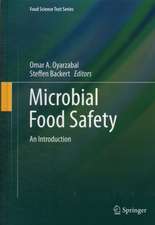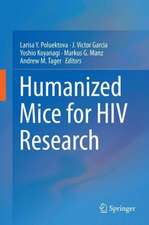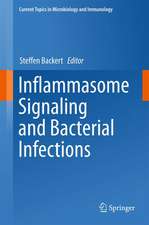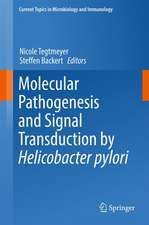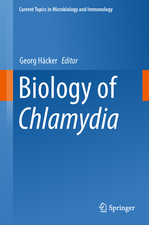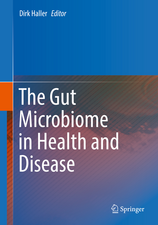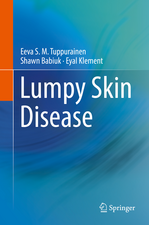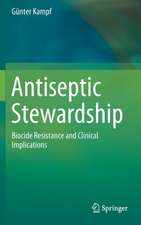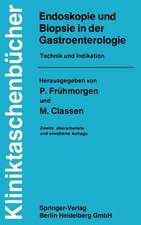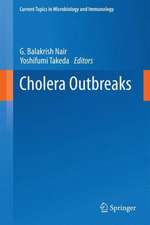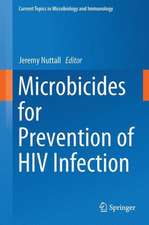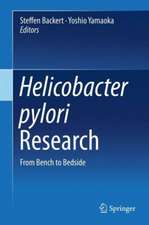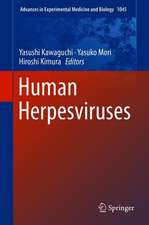Helicobacter pylori in Human Diseases: Advances in Microbiology, Infectious Diseases and Public Health Volume 11: Advances in Experimental Medicine and Biology, cartea 1149
Editat de Shigeru Kamiya, Steffen Backerten Limba Engleză Paperback – 8 noi 2020
H. pylori is a Gram negative microaerophilic bacterium that can produce various gastric diseases including gastritis, gastroduodenal ulceration, gastric cancer and gastric MALT lymphoma. Although efforts to combat H. pylori using a combination of proton pump inhibitor and several antimicrobial drugs have significantly decreased the burden of these gastric diseases, the microbial epidemiology and gastric pathogenesis following H. pylori infection are still not fully understood.
Given its scope, the book offers a valuable resource not only for basic microbiologists, but also for researchers in the fields of pathology, biochemistry and genomics, as well as medical students/scientists.
| Toate formatele și edițiile | Preț | Express |
|---|---|---|
| Paperback (1) | 1098.99 lei 6-8 săpt. | |
| Springer International Publishing – 8 noi 2020 | 1098.99 lei 6-8 săpt. | |
| Hardback (1) | 1107.58 lei 6-8 săpt. | |
| Springer International Publishing – 8 noi 2019 | 1107.58 lei 6-8 săpt. |
Din seria Advances in Experimental Medicine and Biology
- 9%
 Preț: 719.56 lei
Preț: 719.56 lei - 5%
 Preț: 717.00 lei
Preț: 717.00 lei - 5%
 Preț: 717.00 lei
Preț: 717.00 lei - 15%
 Preț: 640.24 lei
Preț: 640.24 lei - 5%
 Preț: 715.71 lei
Preț: 715.71 lei - 5%
 Preț: 716.28 lei
Preț: 716.28 lei - 20%
 Preț: 691.93 lei
Preț: 691.93 lei - 5%
 Preț: 1031.00 lei
Preț: 1031.00 lei - 5%
 Preț: 820.42 lei
Preț: 820.42 lei - 5%
 Preț: 716.28 lei
Preț: 716.28 lei - 15%
 Preț: 641.38 lei
Preț: 641.38 lei - 5%
 Preț: 717.20 lei
Preț: 717.20 lei - 5%
 Preț: 715.35 lei
Preț: 715.35 lei - 5%
 Preț: 1113.83 lei
Preț: 1113.83 lei - 20%
 Preț: 1161.71 lei
Preț: 1161.71 lei - 5%
 Preț: 1170.51 lei
Preț: 1170.51 lei - 18%
 Preț: 1119.87 lei
Preț: 1119.87 lei - 5%
 Preț: 1288.48 lei
Preț: 1288.48 lei - 5%
 Preț: 1164.67 lei
Preț: 1164.67 lei - 5%
 Preț: 1101.73 lei
Preț: 1101.73 lei - 18%
 Preț: 1123.67 lei
Preț: 1123.67 lei - 5%
 Preț: 1435.64 lei
Preț: 1435.64 lei - 20%
 Preț: 1044.10 lei
Preț: 1044.10 lei - 18%
 Preț: 946.39 lei
Preț: 946.39 lei - 5%
 Preț: 292.57 lei
Preț: 292.57 lei - 18%
 Preț: 957.62 lei
Preț: 957.62 lei - 18%
 Preț: 1235.76 lei
Preț: 1235.76 lei - 5%
 Preț: 1231.55 lei
Preț: 1231.55 lei - 5%
 Preț: 1292.30 lei
Preț: 1292.30 lei - 5%
 Preț: 1102.10 lei
Preț: 1102.10 lei - 18%
 Preț: 1132.81 lei
Preț: 1132.81 lei - 5%
 Preț: 1165.19 lei
Preț: 1165.19 lei - 5%
 Preț: 1418.48 lei
Preț: 1418.48 lei - 5%
 Preț: 1305.63 lei
Preț: 1305.63 lei - 18%
 Preț: 1417.72 lei
Preț: 1417.72 lei - 18%
 Preț: 1412.99 lei
Preț: 1412.99 lei - 24%
 Preț: 806.15 lei
Preț: 806.15 lei - 18%
 Preț: 1243.29 lei
Preț: 1243.29 lei - 5%
 Preț: 1429.44 lei
Preț: 1429.44 lei - 5%
 Preț: 1618.70 lei
Preț: 1618.70 lei - 5%
 Preț: 1305.12 lei
Preț: 1305.12 lei - 18%
 Preț: 1124.92 lei
Preț: 1124.92 lei - 5%
 Preț: 1097.54 lei
Preț: 1097.54 lei - 15%
 Preț: 649.87 lei
Preț: 649.87 lei - 5%
 Preț: 1097.54 lei
Preț: 1097.54 lei - 18%
 Preț: 945.79 lei
Preț: 945.79 lei - 5%
 Preț: 1123.13 lei
Preț: 1123.13 lei - 20%
 Preț: 816.43 lei
Preț: 816.43 lei
Preț: 1098.99 lei
Preț vechi: 1156.84 lei
-5% Nou
Puncte Express: 1648
Preț estimativ în valută:
210.32€ • 217.27$ • 175.04£
210.32€ • 217.27$ • 175.04£
Carte tipărită la comandă
Livrare economică 26 martie-09 aprilie
Preluare comenzi: 021 569.72.76
Specificații
ISBN-13: 9783030219185
ISBN-10: 3030219186
Pagini: 284
Ilustrații: XIX, 284 p. 60 illus., 20 illus. in color.
Dimensiuni: 178 x 254 mm
Greutate: 0.54 kg
Ediția:1st ed. 2019
Editura: Springer International Publishing
Colecția Springer
Seriile Advances in Experimental Medicine and Biology, Advances in Microbiology, Infectious Diseases and Public Health
Locul publicării:Cham, Switzerland
ISBN-10: 3030219186
Pagini: 284
Ilustrații: XIX, 284 p. 60 illus., 20 illus. in color.
Dimensiuni: 178 x 254 mm
Greutate: 0.54 kg
Ediția:1st ed. 2019
Editura: Springer International Publishing
Colecția Springer
Seriile Advances in Experimental Medicine and Biology, Advances in Microbiology, Infectious Diseases and Public Health
Locul publicării:Cham, Switzerland
Cuprins
From the contents: 1. Genomic diversity of Helicobacter pylori and human migrations.- 2. Epidemiology, diagnosis and risk factors of Helicobacter pylori infections.- 3. Activities and functional importance of Helicobacter pylori virulence factors.- 4. Structural and functional aspects of the Helicobacter pylori proteome.- 5. Role of adhesion to epithelial cells in gastric colonization by H. pylori.- 6. Interplay of Helicobacter pylori with immune cells: impact on gastric pathology.- 7. Helicobacter pylori infection of children.- 8. Non-malignant Helicobacter pylori-associated diseases.- 9. Malignant Helicobacter pylori-associated diseases: gastric cancer and MALT lymphoma.- 10. Host genetic polymorphisms in gastric disease outcome.- 11. Helicobacter pylori genetic polymorphisms in gastric disease development.- 12. Crosstalk of Helicobacter pylori withthe gastrointestinal microbiota.- 13. Treatment of Helicobacter pylori infection.- 14. Role of probiotics in eradication therapy for Helicobacter pylori infection.- 15. Immunity and vaccine development against Helicobacter pylori.
Notă biografică
Shigeru Kamiya (Kyorin University, Japan)
Steffen Backert (Friedrich-Alexander University Erlangen, Germany)
Steffen Backert (Friedrich-Alexander University Erlangen, Germany)
Textul de pe ultima copertă
This book gathers a wealth of contributions on the virulence factors and pathogenic mechanism of Helicobacter pylori, prepared by leading international experts. In addition, it explores the epidemiology, diagnosis, treatment with drugs and probiotics, and prophylaxis by vaccination, reflecting the latest advances.
H. pylori is a Gram negative microaerophilic bacterium that can produce various gastric diseases including gastritis, gastroduodenal ulceration, gastric cancer and gastric MALT lymphoma. Although efforts to combat H. pylori using a combination of proton pump inhibitor and several antimicrobial drugs have significantly decreased the burden of these gastric diseases, the microbial epidemiology and gastric pathogenesis following H. pylori infection are still not fully understood.
Given its scope, the book offers a valuable resource not only for basic microbiologists, but also for researchers in the fields of pathology, biochemistry and genomics, as well as medical students/scientists.
H. pylori is a Gram negative microaerophilic bacterium that can produce various gastric diseases including gastritis, gastroduodenal ulceration, gastric cancer and gastric MALT lymphoma. Although efforts to combat H. pylori using a combination of proton pump inhibitor and several antimicrobial drugs have significantly decreased the burden of these gastric diseases, the microbial epidemiology and gastric pathogenesis following H. pylori infection are still not fully understood.
Given its scope, the book offers a valuable resource not only for basic microbiologists, but also for researchers in the fields of pathology, biochemistry and genomics, as well as medical students/scientists.
Caracteristici
Reviews the virulence factors and pathogenic mechanisms of H. pylori Assesses microbial epidemiology and gastric pathogenesis following H. pylori infections Offers a wealth of valuable insights for microbiologists and medical scientists alike

